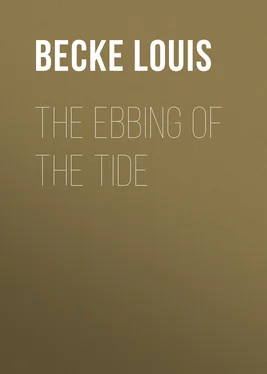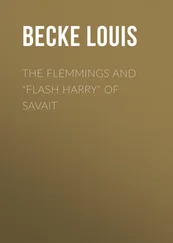Louis Becke - The Ebbing Of The Tide
Здесь есть возможность читать онлайн «Louis Becke - The Ebbing Of The Tide» — ознакомительный отрывок электронной книги совершенно бесплатно, а после прочтения отрывка купить полную версию. В некоторых случаях можно слушать аудио, скачать через торрент в формате fb2 и присутствует краткое содержание. Жанр: foreign_prose, literature_19, foreign_antique, на английском языке. Описание произведения, (предисловие) а так же отзывы посетителей доступны на портале библиотеки ЛибКат.
- Название:The Ebbing Of The Tide
- Автор:
- Жанр:
- Год:неизвестен
- ISBN:нет данных
- Рейтинг книги:5 / 5. Голосов: 1
-
Избранное:Добавить в избранное
- Отзывы:
-
Ваша оценка:
- 100
- 1
- 2
- 3
- 4
- 5
The Ebbing Of The Tide: краткое содержание, описание и аннотация
Предлагаем к чтению аннотацию, описание, краткое содержание или предисловие (зависит от того, что написал сам автор книги «The Ebbing Of The Tide»). Если вы не нашли необходимую информацию о книге — напишите в комментариях, мы постараемся отыскать её.
The Ebbing Of The Tide — читать онлайн ознакомительный отрывок
Ниже представлен текст книги, разбитый по страницам. Система сохранения места последней прочитанной страницы, позволяет с удобством читать онлайн бесплатно книгу «The Ebbing Of The Tide», без необходимости каждый раз заново искать на чём Вы остановились. Поставьте закладку, и сможете в любой момент перейти на страницу, на которой закончили чтение.
Интервал:
Закладка:
Louis Becke
The Ebbing Of The Tide / South Sea Stories – 1896
“LULIBAN OF THE POOL”
A boy and a girl sat by the rocky margin of a deep mountain pool in Ponape in the North Pacific. The girl was weaving a basket from the leaves of a cocoa-nut. As she wove she sang the “Song of Luliban,” and the boy listened intently.
“‘Tis a fine song that thou singest, Niya,” said the boy, who came from Metalanien and was a stranger; “and who was Luliban, and Red-Hair the White Man?”
“ O Guk! ” said Niya, wonderingly, “hast never heard in Metalanien of Luliban, she who dived with one husband and came up with another—in this very pool?”
“What new lie is this thou tellest to the boy because he is a stranger?” said a White Man, who lay resting in the thick grass waiting for the basket to be finished, for the three were going further up the mountain stream to catch crayfish.
“Lie?” said the child; “nay, ‘tis no lie. Is not this the Pool of Luliban, and do not we sing the ‘Song of Luliban,’ and was not Red-Hair the White Man—he that lived in Jakoits and built the big sailing boat for Nanakin, the father of Nanakin, my father, the chief of Jakoits?”
“True, Niya, true,” said the White Man, “I did but jest; but tell thou the tale to Sru, so that he may carry it home with him to Metalanien.”
Then Niya, daughter of Nanakin, told Sru, the boy from Metalanien, the tale of Luliban of the Pool, and her husband the White Man called “Red-Hair,” and her lover, the tattooed beachcomber, called “Harry from Yap.”
“It was in the days before the fighting-ship went into Kiti Harbour and burnt the seven whaleships as they lay at anchor 1 1 The Shenandoah, in 1866.
that Red-Hair the White Man lived at Jakoits. He was a very strong man, and because that he was cunning and clever at fishing and killing the wild boar and carpentry, his house was full of riches, for Nanakin’s heart was towards him always.”
“Was it he who killed the three white men at Roan Kiti?” asked the White Man.
“Aye,” answered Niya, “he it was. They came in a little ship, and because of bitter words over the price of some tortoise-shell he and the men of Nanakin slew them. And Red-Hair burnt the ship and sank her. And for this was Nanakin’s heart bigger than ever to Red-Hair, for out of the ship, before he burnt her, he took many riches—knives, guns and powder, and beads and pieces of silk; and half of all he gave to Nanakin.”
“ Huh! ” said Sru, the boy. “He was a fine man!”
“Now, Harry from Yap and Red-Hair hated one another because of Luliban, whom Nanakin had given to Red-Hair for wife. This man, Harry, lived at Ngatik, the island off the coast, where the turtles breed, and whenever he came to Jakoits he would go to Red-Hair’s house and drink grog with, him so that they would both lie on the mats drunk together. Sometimes the name of Luliban would come between them, and then they would fight and try to kill each other, but Nanakin’s men would always watch and part them in time. And all this was because that Luliban had loved Harry from Yap before she became wife to Red-Hair. The men favoured the husband of Luliban because of Nanakin’s friendship to him, and the women liked best Harry from Yap because of his gay songs and his dances, which he had learnt from the people of Yap and Ruk and Hogelu, in the far west; but most of all for his handsome figure and his tattooed skin.
“One day it came about that his grog was all gone, and his spirit was vexed, and Red-Hair beat Luliban, and she planned his death from that day. But Nanakin dissuaded her and said, ‘It cannot be done; he is too great a man for me to kill. Be wise and forget his blows.’
“Then Luliban sent a messenger to Ngatik to Harry. He came and brought with him many square bottles of grog, and went in to Red-Hair’s house, and they drank and quarrelled as they ever did; but because of what lay in his mind Harry got not drunk, for his eyes were always fixed on the face of Luliban.
“At last, when Red-Hair was fallen down on the mats, Luliban whispered to Harry, and he rose and lay down on a couch that was placed against the cane sides of the house. When all were asleep, Luliban stole outside and placed her face against the side of the house and called to Harry, who feigned to sleep. And then he and she talked for a long time. Then the white man got up and went to Nanakin, the chief, and talked long with him also.
“Said Nanakin the chief, ‘O White Man, thou art full of cunning, and my heart is with thee. Yet what will it profit me if Red-Hair dies?’
“‘All that is now his shall be thine,’ said Harry.
“‘And what shall I give thee?’ said Nanakin.
“‘Only Luliban,’” said the White Man with the tattooed body.
“On the morrow, as the day touched the night, the people of Jakoits danced in front of Nanakin’s house, and Harry, with flowers in his hair and his body oiled and stained with turmeric, danced also. Now among those who watched him was Luliban, and presently her husband sought her and drove her away, saying; ‘Get thee to my house, little beast. What dost thou here watching this fool dance!’
“Harry but laughed and danced the more, and then Red-Hair gave him foul words. When the dance was ended, Harry went up to Red-Hair and said, ‘Get thee home also, thou cutter of sleeping men’s throats. I am a better man than thee. There is nothing that thou hast done that I cannot do.’
“Then Nanakin, whose mouth was ready with words put therein by Luliban, said, ‘Nay, Harry, thou dost but boast. Thou canst not walk under the water in the Deep Pool with a heavy stone on thy shoulder—as Red-Hair has done.’
“‘Bah!’ said Harry. ‘What he can do, that I can do.’
“Now, for a man to go in at one end of this pool here”—and Niya nodded her head to the waters at her feet—“and walk along the bottom and come out at the farther end is no great task, and as for carrying a heavy stone, that doth but make the task easier; but in those days there were devils who lived in a cave that is beneath where we now sit, and none of our people ever bathed here, for fear they would be seized and dragged down. But yet had Red-Hair one day put a stone upon his shoulder, and carried it under the water from one end of the pool to another—this to show the people that he feared no devils. But of the cave that can be gained by diving under the wall of rock he knew nothing—only to a few was it known.
“‘Show this boaster his folly,’ said Nanakin to Red-Hair, who was chewing his beard with wrath. And so it was agreed upon the morrow that the two white men should walk each with a stone upon his shoulder, in at one end of the deep pool and come out of the other, and Harry should prove his boast, that in all things he was equal to Red-Hair.”
“When Red-Hair went back to his house Luliban was gone, and some said she had fled to the mountains, and he reproached Nanakin, saying: ‘Thy daughter hath fled to Ngatik to the house of Harry. I will have her life and his for this.’ But Nanakin smoothed his face and said: ‘Nay, not so; but first put this boaster to shame before the people, and he shall die, and Luliban be found.’
“Now, Luliban was hid in another village, and when the time drew near for the trial at the pool she went there before the people. In her hand she carried a sharp toki (tomahawk) and a long piece of strong cinnet with a looped end. She dived in and clambered out again underneath and waited. The cave is not dark, for there are many fissures in the top through which light comes when the sun is high.
“The people gathered round, and laughed and talked as the two white men stripped naked, save for narrow girdles of leaves round their loins. The skin of Red-Hair was as white as sand that lies always in the sun that of Harry was brown, and covered from his neck to his feet with strange tattooing, more beautiful than that of the men of Ponape.
Читать дальшеИнтервал:
Закладка:
Похожие книги на «The Ebbing Of The Tide»
Представляем Вашему вниманию похожие книги на «The Ebbing Of The Tide» списком для выбора. Мы отобрали схожую по названию и смыслу литературу в надежде предоставить читателям больше вариантов отыскать новые, интересные, ещё непрочитанные произведения.
Обсуждение, отзывы о книге «The Ebbing Of The Tide» и просто собственные мнения читателей. Оставьте ваши комментарии, напишите, что Вы думаете о произведении, его смысле или главных героях. Укажите что конкретно понравилось, а что нет, и почему Вы так считаете.












